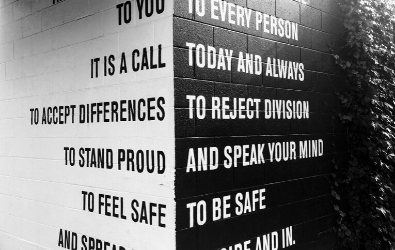Words are the most powerful tools public relations professionals have. The right words inspire action and build support. The wrong words can offend, alienate, or fail to make an impact at all.
In this era, when our discourse is more divided than ever, we need to communicate with as wide an audience as possible. I recently attended “The Language We Use: Who It Includes and Who We Leave Out,” a forum at the Roxbury Innovation Center, sponsored by ComNetworkBOSTON.
For two hours, a panel of experts from politics, public relations, and nonprofits discussed ways in which we all can make our communications more open and welcoming. Some of their points follow:
- Keep up with how language is changing – The way we talk about race, gender, religion and sexual orientation are constantly evolving. Panelists reinforced the need to use current terms that make people comfortable, from using “they” to describe someone who is gender fluid, to saying “Latinx” instead of “Latino.” Speakers also called our attention to the ways in which word choices can affect those who are disabled. Saying, “I’m going to jump in to the conversation,” could feel alienating to someone who doesn’t jump.
- Be consistent in how you talk about people – When speaking to a reporter, donor or colleague about someone your organization is supporting, we should ask ourselves whether we would describe this person in the same way if they were a part of the conversation. It’s easy to portray someone in an overly dramatic way, almost like they are a character in a movie, in order to inspire action. But, to the person you are talking about, it is more than a story, it is their life. Be sensitive to what they are comfortable sharing. Respect their wishes if they ask you to leave something out, even if that detail would help promote your client.
- Seek out as many voices as possible – The panelists encouraged the audience to be aware of who is in the room when important conversations are happening and who is not. Making the effort to have as many different voices involved is vital to making sure decisions reflect the needs of everyone. They also recommended listening to people with opposing views, even if what they say makes your blood boil, and to reach out to the quiet person in the room who may have something important to say, but may not be as assertive about expressing their opinion.
The forum offered an opportunity for self-reflection. Like many people, I find it challenging to talk about these issues. It’s sobering to realize that despite my best efforts, I have probably unintentionally offended people by my words or actions, as most of us do at one point or another. But the solution isn’t to put our heads in the sand or avoid that uncomfortable conversation with a relative we don’t agree with at the Thanksgiving table. Instead, the solution is to keep trying, asking questions, listening, talking, and learning about these issues.


